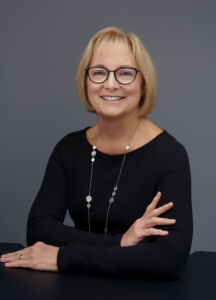“I learned very quickly that we had no idea of the challenges and vulnerabilities families had in New Jersey outside the hospital walls.”
– Robyn D’Oria
Interview with Robyn
Trained as a labor and delivery nurse, Robyn D’Oria dedicated the first half of her career to the acute care setting and teaching nursing. The second half has been with Central Jersey Family Health Consortium, using her skills to ensure the health and well-being of families.
We selected Robyn as a Community Champion for her passion for and dedication to supporting moms and babies. She carefully nurtured a skilled team of nurse home visitors, collaborated with the Trenton Health Team to raise community awareness of the pilot program, and used her leadership platform to share valuable lessons learned. Her work inspires others and advances the impact of community-centered nursing.

What’s the core mission of your organization and how do you carry it out?
Our mission at the Central Jersey Family Health Consortium is to promote an equitable and healthy future for families through service or services, advocacy, education, and collaboration. Our vision is to ensure a legacy of health, one family at a time. We carry this out by providing public health initiatives in the maternal child health space. Our programs affect not only families, but also individuals of childbearing age and children from infancy through adolescence.
What accomplishment are you most proud of?
Being part of the pilot for Family Connects NJ Universal Home Visiting, and then being able to be part of the group that is rolling this out statewide is the culmination of my career.
The program serves families in New Jersey that have had a baby, are fostering, or serving as a resource family, or for families who unfortunately have suffered a stillbirth. Having been in the hospital for 20 some years, I really felt very connected to families — having been there to witness when a life was “born” — and it was a fabulous experience.
At the time, we thought we were taking care of all the needs a family might have prior to discharge. What I learned very quickly after leaving the bedside was that we had no idea of the challenges and vulnerabilities families in New Jersey had outside the hospital walls. We thought we did, but we really did not.
Family Connects NJ helps bridge the gaps between prenatal care, labor and delivery, early postpartum and the later postpartum period – and it does this at the family’s home – the place where parents and baby are establishing that family unit. This is when we help ensure they have the healthiest start in life by making referrals, connecting them to additional clinical care as needed, and circumventing any complications that might arise in those first few weeks after delivery. Family Connects is currently in 2 counties in Central Jersey serviced by CJFHC, and we’ll be rolling out 2 more, so CJFHC will cover 4 counties as of January 1. Between the three agencies providing Family Connects in New Jersey, 7 counties will be rolling out in 2025 for a total of 11 counties that will have access to Family Connects NJ services.
What’s the biggest challenge facing families in the first 1,000 days?
For first-time parents, just adjusting to life with a newborn is huge. You have to care for the mom as she recuperates from childbirth, and then you have the newborn – their acclimation to life outside the womb and their introduction to the home. I think simply the event of becoming a family with a newborn is a challenge. Related to that, I am shocked, appalled and amazed at the lack of food and such basic necessities as diapers, in our communities today. Having these basic needs met is necessary to ensure the child’s health and well-being, not only for the first 1,000 days, but even beyond. We’ve gone to homes where there was essentially no food in the house. None — not for mom or the baby, and for those who say, “Oh, well, she’ll breastfeed,” if she’s not eating, that breast milk won’t be there either.
Another huge piece of the puzzle is our changing community. One of the challenges we’ve had is being able to ensure we have culturally and linguistically congruent care. Approximately 50% of the people that we’ve seen to date, and there’ve been over 2,000 visits statewide for Universal Home Visiting, require some type of language assistance.
What gives you hope for families?
What gives me hope is the growing attention to maternal health and its critical impact on child health, and the attention being paid to providing care in a healthy, accessible and sustainable way. I am also encouraged by the increased knowledge of and responsiveness to trauma-informed care, recognizing that trauma can influence health and wellness later in life. During those early years, a child is deeply imprinted by their surroundings, how they are treated and what they witness – all of which have long-term effects. That, to me, is hopeful because in the past we didn’t recognize that and we dismissed those types of things when raising children. Now we recognize the importance of paying attention to adverse childhood events.
What’s the secret to a great partnership?
Trust. Trust in each other, trust in our partners’ expertise, and listening to what the other has to say. What makes a partnership work is being able to collaborate and being able to trust that the other partner will follow through and that they believe in what you’re doing just as much as you do.
